SAP Ariba Contracts, a cloud-based solution offered by SAP Ariba, facilitates all the contract management needs of your business. Contracts are one of the most important legal documents that helps you smoothly manage supplier performance throughout the supplier lifecycle while avoiding non-compliance.
The traditional view of contract management mainly focused on contract drafting and storage. However, contract management is more than that as it has several stages, such as drafting, creation, approval, agreement, amendments, and consumption.
Effective contract management can improve efficiency across all business processes to boost the ROI. For example, a PwC research concluded that a systematic and automated contract management system could shorten your negotiation time and resources by half and reduce contract management costs by 10-30%.
This article will tell you about the varying aspects and stages of the contract management process and show how to manage it all through SAP Ariba Contracts. It will also introduce you to the user interface and application workflow of SAP Ariba Contracts.

Table of Contents
What is Contract Management?
Contract management is a process to facilitate all the involved parties to perform their responsibilities throughout the contract’s lifecycle. Before exploring contract management further, let’s get a clear idea of a contract.
The contract outlines your business’s roles, responsibilities, expectations, tasks, and timeline with suppliers, clients, employees, and relevant stakeholders. In short, a contract is a legal document specifying the relationship with your organizational partners. However, for several years, contract management has been seen merely as an administrative system to draft and store contracts so that the documents are easily accessible by all of the business units and departments.
However, as organizations and businesses grow exponentially with digital transformation, managers realize the true importance of practical contract management approaches. Contract management comes into action right from the moment you start negotiating with your suppliers. Afterward, you can achieve several business benefits through effective contract management, such as:
- Better supplier performance and risk management;
- Better spend management;
- Improved strategic, long-term, and sustainable relationships;
- Minimization of administrative, legal, operational, and contract management expenses;
- Standardization of contract creation and approval process;
- Higher level of automation throughout the business; and
- Higher compliance with external authoritative bodies.

Contract Management Activities
Contract management activities are now spread over several business units of an organization. Usually, there are two types of procurements based on the purpose of the procured goods or services – direct procurement and indirect procurement.
Direct procurement indicates the procurement of raw materials, goods, and services used in the company’s manufacturing or core business process. Businesses usually add value to such procured products and sell it to the customers after processing. For instance, a tire manufacturer may procure rubber from one or more suppliers. On the other hand, indirect procurement indicates the procurement of goods and services essential to running the business operations smoothly; however, those are not processed into finished products. Examples of indirect procurement include legal services, outsourced human resource management services, supply of stationeries etc.
Usually, direct procurement contracts are concrete and standardized. However, indirect procurement contracts tend to lack such standardization. Due to this nature, several unique contract management activities are part of indirect contracts, and businesses can benefit significantly by having an automated contract management approach.
Let’s get familiar with those activities now.
- Terms & Conditions Management: Businesses and suppliers often do not use standardized and compliant legal languages while specifying the terms and conditions of an indirect contract. Due to the absence of pre-configured templates, they tend to ignore their importance, which may often lead to performance management issues and dissatisfaction down the road.
- Contract Planning and Negotiation Planning: Contract planning indicates the overall process of parties entering into a new contract. The steps are often not defined and discussed. Suppliers’ relative power plays a role during the negotiation and agreement phase. Without a predefined approach, parties find it difficult to amend the contract.
- Post Award Contract Management and Control: Contract management does not end with contracts being awarded. Businesses need to monitor suppliers to initiate corrective measures continuously. Companies find it challenging to keep track of contract changes for audit.
Now that we are familiar with contract management’s pain areas let’s see how SAP Ariba Contracts, a contract management platform offered by SAP Ariba, helps alleviate those.
What is SAP Ariba Contract?
SAP Ariba Contract is a cloud-based, comprehensive contract management solution offered as a part of the SAP Ariba Strategic sourcing suite. The SaaS platform links SAP Ariba Sourcing and SAP Ariba Supplier Lifecycle and Performance, helping businesses manage all aspects of contract management and automation.
SAP Ariba Contracts offers end-to-end solutions for contract management, from contract creation to negotiation to amendments.
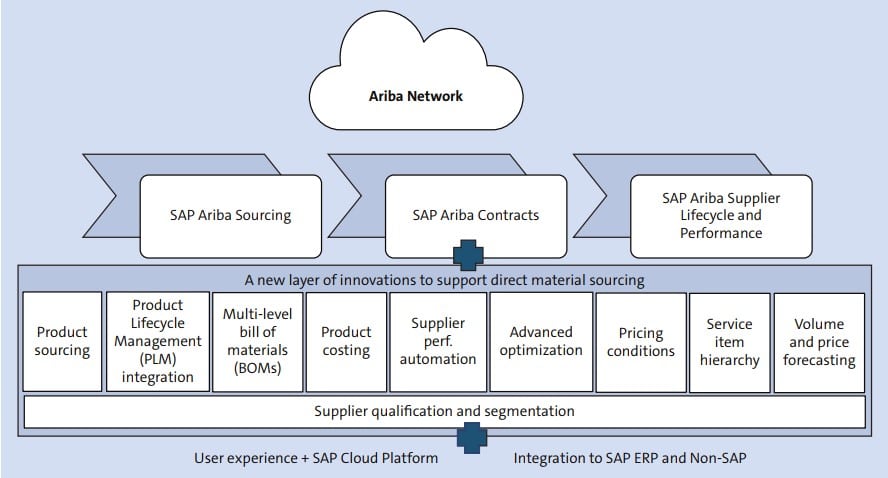
SAP Ariba Contract helps manage two significant aspects of contract management. One occurs during the pre-award stage and the other during the post-award phase.
- Contract Management: Contract management typically involves all activities before awarding a contract. It includes contract requests, drafting, negotiation, approval, and final contract implementation. Electronic signature exchange and validation are also part of an automated contract management process.
- Commitment Management: Commitment management involves everything that occurs in the post-award stage, such as performance monitoring, ongoing quality assessment, risk management, reminders, and reporting capabilities.
SAP Ariba Contracts remains in a fully-hosted cloud environment allowing businesses to minimize on-site implementation investments. As a result, organizations can implement it in a short time with a lower total cost of ownership compared to any on-premise solutions.
Features of SAP Ariba Contracts
There are three aspects of the SAP Ariba Contracts: technology, community, and Capabilities. Let’s explore each of those areas closely.
- Technology
Technologically, SAP Ariba Contract is offered as a SaaS-enabled multi-tenants platform to manage your contracts throughout the contract lifecycle. It helps you streamline the following tasks and, as a result, makes your entire business process efficient:
- Management of sales contracts, procurement details, licensing and franchising agreements, and all other contracts.
- Standardization, automation and simplification of contract management activities such as creation, drafting, and maintenance throughout the entire contract lifecycle.
- Make it easier to comply with legal and regulatory bodies.
- Keep records of contract amendments, renewals, and expirations for better auditory performance.
- Comprehensive and accurate search and reporting system, and easy to be modified by an end-user.
- Easy integration with SAP’s ecosystem and compatible with third-party ERP systems.
- Community
SAP Ariba Contracts is closely integrated with the SAP’s ecosystem. Thus, you will also benefit from SAP’s strategic partnership with other global companies. Benefits include:
- Collaboration with trading partners, and internal and external stakeholders using Ariba’s Supplier network.
- Collaboration with DocuSign allows you to implement an authentic electronic signature system.
- Capabilities
Additional technical capabilities and support from SAP include the following:
- Availability of SAP’s team of experts to ensure smooth adaptation along with comprehensive range of training and consultation.
- Minimization of on-site cost through effective and multi-functional web-based templates.
- Availability of conditional contract templates.
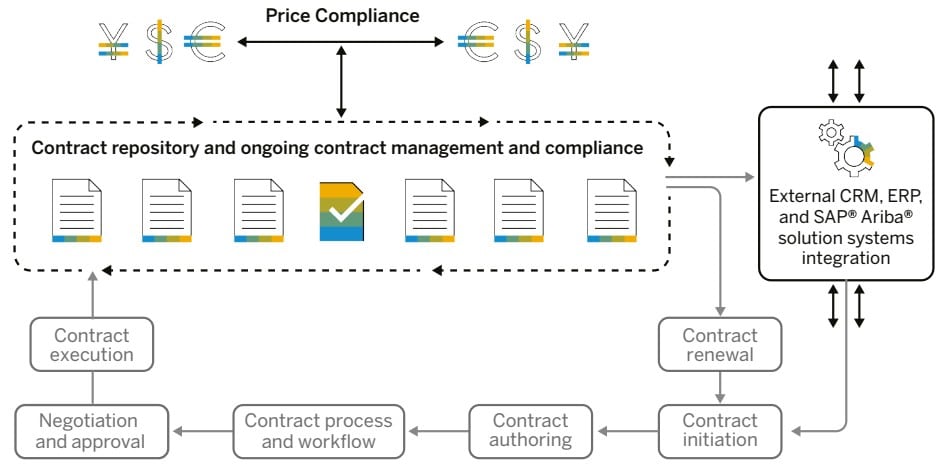
Additional Advantages of SAP Ariba Contracts
There are several additional advantages of using SAP Ariba Contracts, such as:
- Quick implementation: SAP’s expertise can help you get your contract management system up and running in a short time. As the system is entirely cloud-hosted, your IT investment will be minimal.
- Easy usability and drafting: The platform will let you use MS Word to create and write any contracts using Word-based ready-to-use templates. Thus you can get the ball rolling with the minimal training requirements.
- Alert notifications: Ariba Contract will immediately alert you through notifications if the vendors make any modifications to the pre-approved template or agreements. You will automatically get an option to proceed with a controlled, nonstandard agreement process.
- Collaboration: Multiple parties, stakeholders, and vendors can collaborate using a shared, updated workspace in real-time. This will eliminate scopes for confusion and communication gaps.
- Visibility: A dynamic dashboard, automated notifications, and customized reporting system will always keep you informed about the latest status of your business contracts.
- On-demand storage: SAP Ariba will provide you with on-demand secured storage facilities with a robust searching system so that you won’t have to worry about the safekeeping of your confidential business documents.
- Effortless renewals: The system will automatically notify you well ahead of any milestone dates so that you can always take steps to renew your profitable contracts while letting the less suitable ones expire.
Now that we have become familiar with the use cases, strengths, and capabilities of SAP Ariba Contracts, it’s time to get introduced to the application and its user interface.
SAP Ariba Contracts: Dashboard and Tools
SAP Ariba Contracts is closely integrated with the SAP Ariba procurement suite, including SAP Ariba Sourcing and SAP Ariba Supplier Lifecycle Performance management (SLP). Typically, once a supplier is onboarded through SAP Ariba SLP, or a sourcing request through SAP Ariba Sourcing, a contract request is generated in SAP Ariba Contracts.
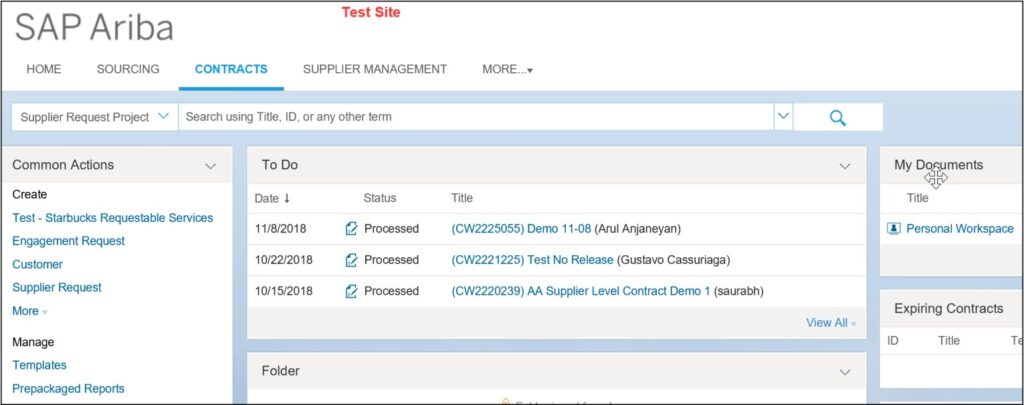
Due to this close integration, the SAP Contracts tab is located between the Sourcing and Supplier Management tabs inside the Ariba Strategic Suits dashboard.
The following diagram illustrates a simple contract initiation process.

Once you open a project template for a contract, the following window will open.
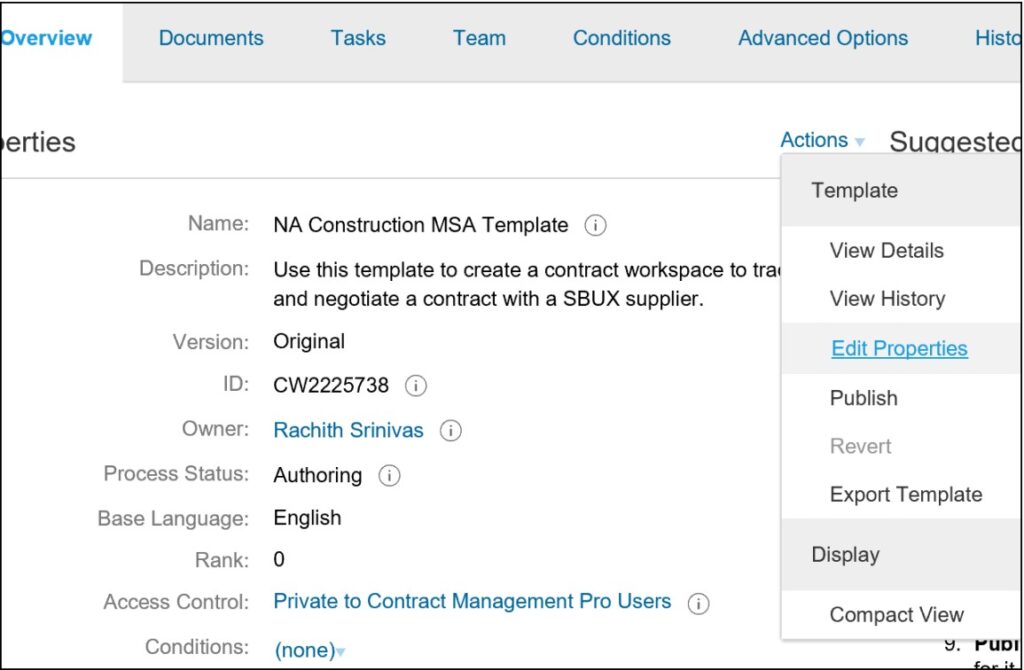
Let’s look into the individual functions of each tab.
Overview Tab
You will get a quick look of the template’s main properties from the overview tab. Clicking on the action menu located beside each property will let you edit the values. The access control will let you choose which users from your organization will have access to the contract created with this template.
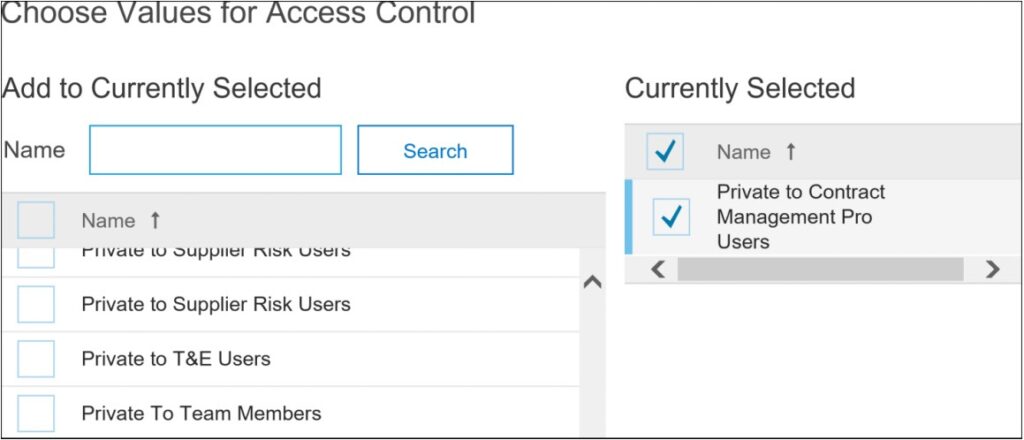
Documents Tab
This tab will open an action menu, letting you create and organize different types of documents. You can either create a document from scratch or import it through SAP Ariba solutions or the sourcing library.
You will see the following application window when creating a document from an existing MS Word-based template.
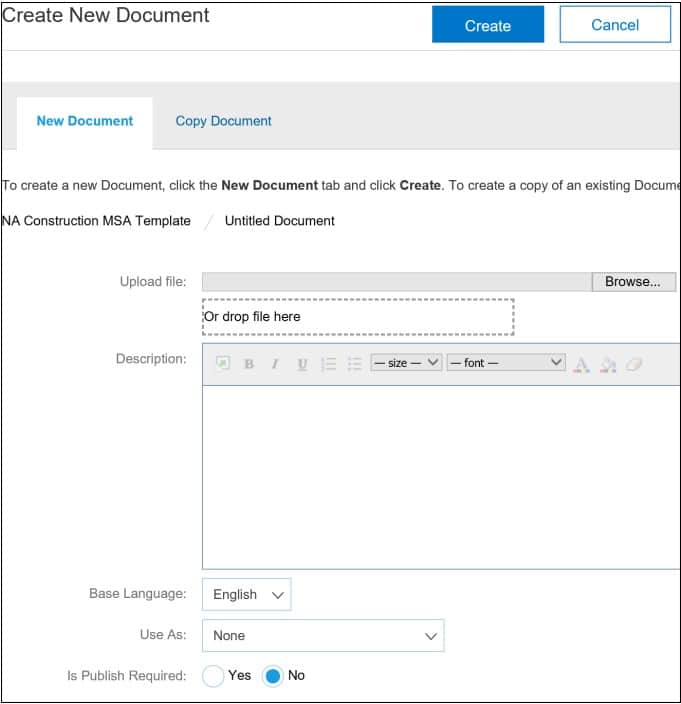
Tasks Tab
You can identify each phase, tasks, and related milestones within the task tab. Standardizing the tasks and processes will help you with the audit process and maintaining regulatory compliance. The panel lets you create the following tasks:
- To-do tasks
- Review and approval tasks
- Negotiation tasks
- Notification tasks
By default, the tasks panel will include the following standardized tasks and phases which you can modify as well. The phases begin with initiation and end with the amendment process.
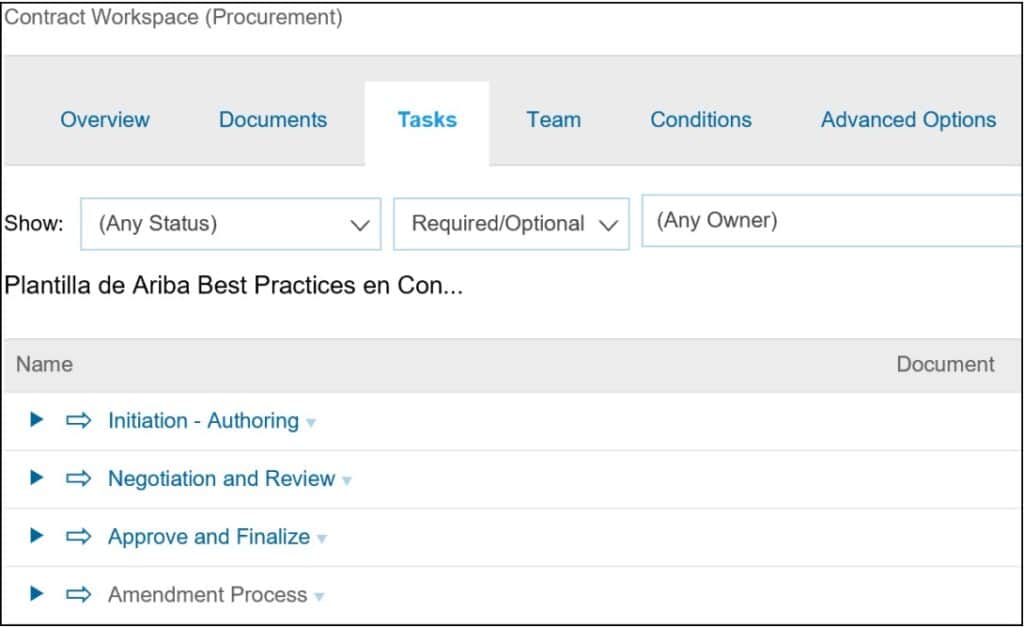
Each of the phases has their individual standardized tasks listed under them. Such as:
Tasks in the authoring phases –

Tasks in the negotiation and review phase –

Tasks in the approval and finalize phase –
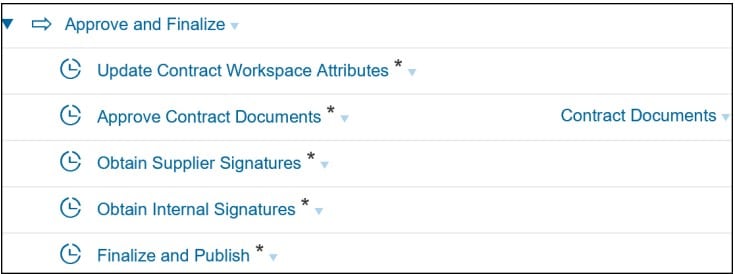
Team Tab
You can create one or multiple project groups for collaboration under the team tab and add members either manually or automatically. You can also define their roles in the project as “view only” or “view/edit.”

Once you finalize all the documents, create the tasks, and add the relevant team members with their specific roles, you can go back to the overview tab to publish the template and begin your contract authoring process.
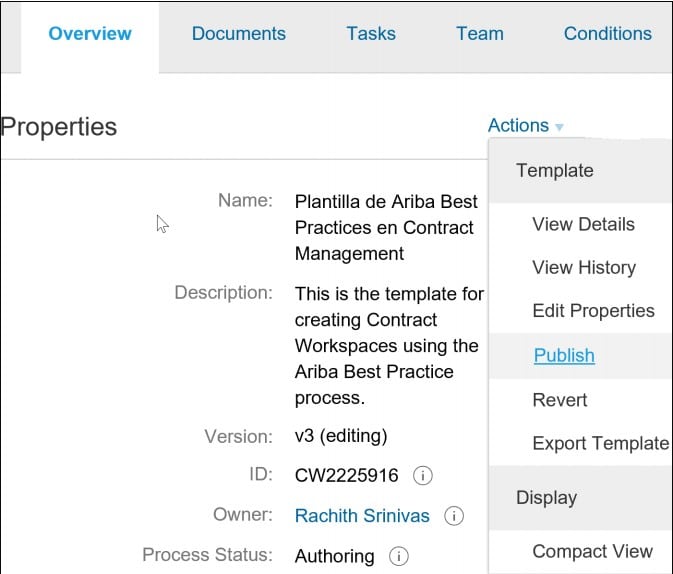
How to Create a Contract in SAP Ariba?
As mentioned earlier, SAP Ariba Contracts will support you throughout the entire contract lifecycle. Now we will show you can create and manage a contract with SAP Ariba Contracts.
How to Create A Contract?
You will follow a set of predefined steps to create your contract, and the first one is contract authoring. It is preceded by workspace customization, loading of master data, and completing electronic signatures.
Contract authoring is the process of finalizing your contract templates. Usually, the legal team and senior administrators participate in this stage. The objective of contract authoring is to maintain an organization-wide standardization of contracts. Afterward, the end-users can begin the contract creation process using the master agreement templates.
Once you finalize the template, you can also configure the contract approval process that your mid-level managers would follow. Approvals can be in parallel, serial or custom orders.
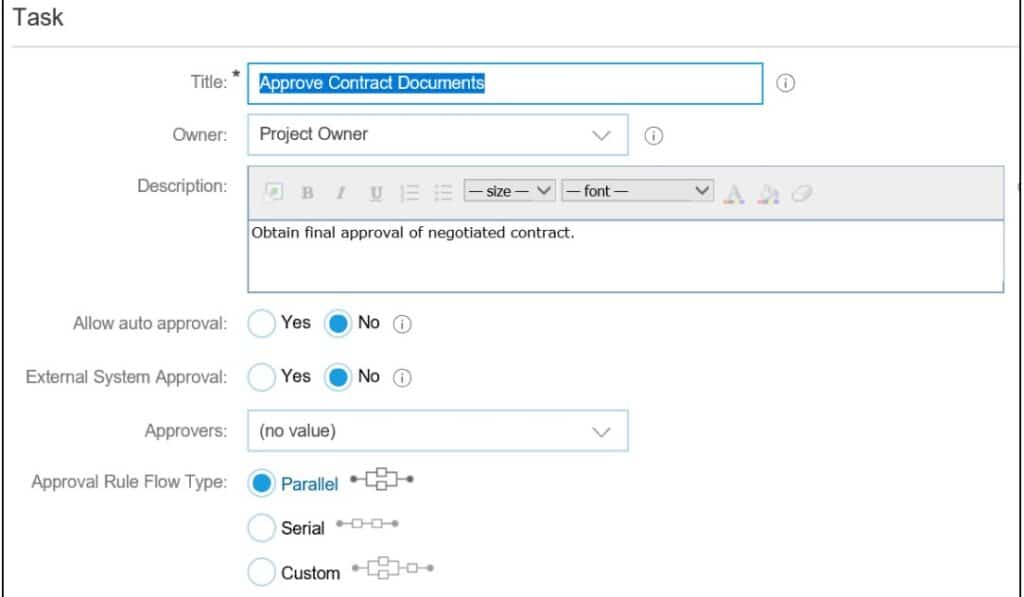
End-users can access their contract creation dashboard or contract workspace after logging in to the SAP Ariba system. The workspace allows you to create three basic types of contracts – sales, procurement, and internal contracts.
You can create a contract in three ways, which are:
- Sourcing event: Once a sourcing event is generated using the SAP Ariba Sourcing solution, you can use it to create a new contract. In that case, you will find a contract creation button next to each supplier’s name within the sourcing event page.
- Standalone workspace: Your organizational members can request the creation of a new contract workspace without a sourcing event by adding suppliers manually. Once the request is approved by contract managers, the users can proceed with the creation process.
- Without request: Contract agents or contract managers can create a contract directly without a sourcing event or contract request.
How to Manage A Contract?
There are two major aspects of contract management in SAP Ariba Contracts – Contract Consumption and Contract Amendment.
Contract consumption typically happens when a contract reaches or approaches its expiry time. Due to the close integration of Ariba Contracts with other SAP Ariba or ERP solutions, if you close a contract workspace after consultation, it will also be completed in the downstream system, in this case, SAP Ariba Buying and Invoicing.
Instead of consumption, you may also decide to renew or amend your contract during an “expired” or “published” status. Contract authors receive prior notifications about contract renewals or expirations, and they can also allow other users to receive the same. During a renewal, you can modify the following settings of an ongoing contract:
- Contract terms or expiration dates
- Tasks
- Documents

Additionally, there are three types of amendments you can perform as well. Such as:
- Full Amendment allows modification of the complete workspace.
- Termination allows ending an ongoing and published contract before the actual expiry date.
- Finally, the administrative option allows your team members or contract parties to upload documents for a particular time.
Integration with SAP Ariba Contracts
SAP Ariba Contracts integrates with the SAP Ariba suite, SAP ERP and SAP S4/HANA, or other third-party solutions. In addition, the workspace of a published contract provides you with multiple options to export it to other applications. For example, you can create a sourcing event using SAP Ariba Sourcing, and once you have finalized the process of awarding the supplier, you can copy all the information from the sourcing event, for example the vendor details, pricing, SKU’s and copy it all to the SAP Ariba contracts module. This is a great integration option in my opinion and SAP Ariba excels in this area.
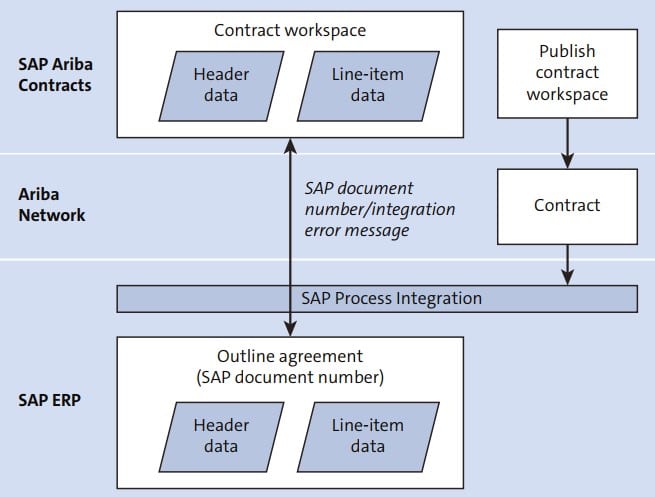
If you purchase a full source-to-order or source-to-pay solution from SAP Ariba, you must perform suite integration to allow SAP Ariba Contracts to work smoothly with upstream and downstream solutions. After the suite integration, you can access the SAP Ariba Contracts creation and management process from your SAP Ariba Sourcing (upstream) or SAP Ariba Buying and Invoicing interfaces (downstream).
A Few Drawbacks
Although SAP Ariba Contracts is a very well-structured and comprehensive contract management solution for large businesses, take note of a few shortcomings. Such as:
- There are no free trials or freemium versions for the platform.
- Implementation with SAP S4/HANA, SAP ERP, and other ERPs is highly technical and involves the the use of the recommended project management methodology using SAP implementation procedure steps. Therefore, you will most likely require external assistance.
Certified SAP consultants and implementation partners can assist you in every step of your Ariba Contracts implementation after identifying your specific business needs. Drop a note to SpendWizard to connect with leading industry experts and SAP Ariba consultants.
Wrap Up
SAP Ariba Contracts comprehensively supports you to effectively managing your business contracts throughout their entire lifecycle. In addition, its tight integration with SAP Ariba Strategic solutions ensures seamless operation across your organizational departments. If you want to get an accurate price quote for the Ariba Contracts, head to SAP’s official e-store and contact the sales team with your business and organizational details.
- Overview of the Material Master in SAP S/4HANA - January 2, 2024
- SAP FICO TRANSACTION CODES (MOST COMMON) - December 24, 2023
- Best SAP S/4HANA MM Books for Beginners and Advanced Learners - November 25, 2023





0 Comments